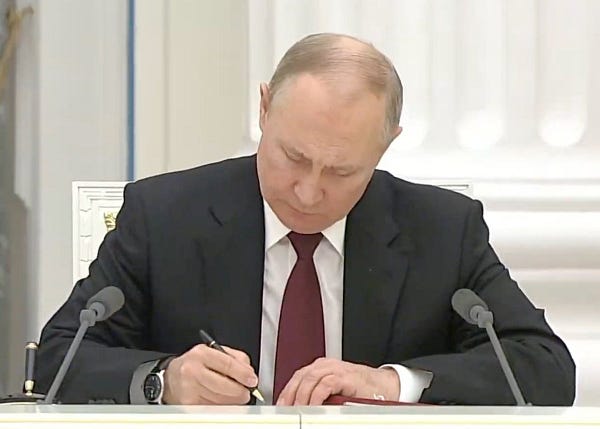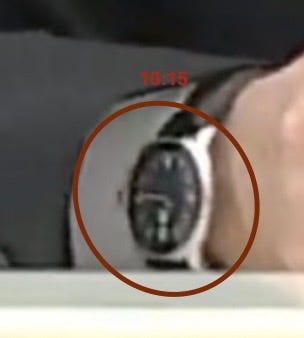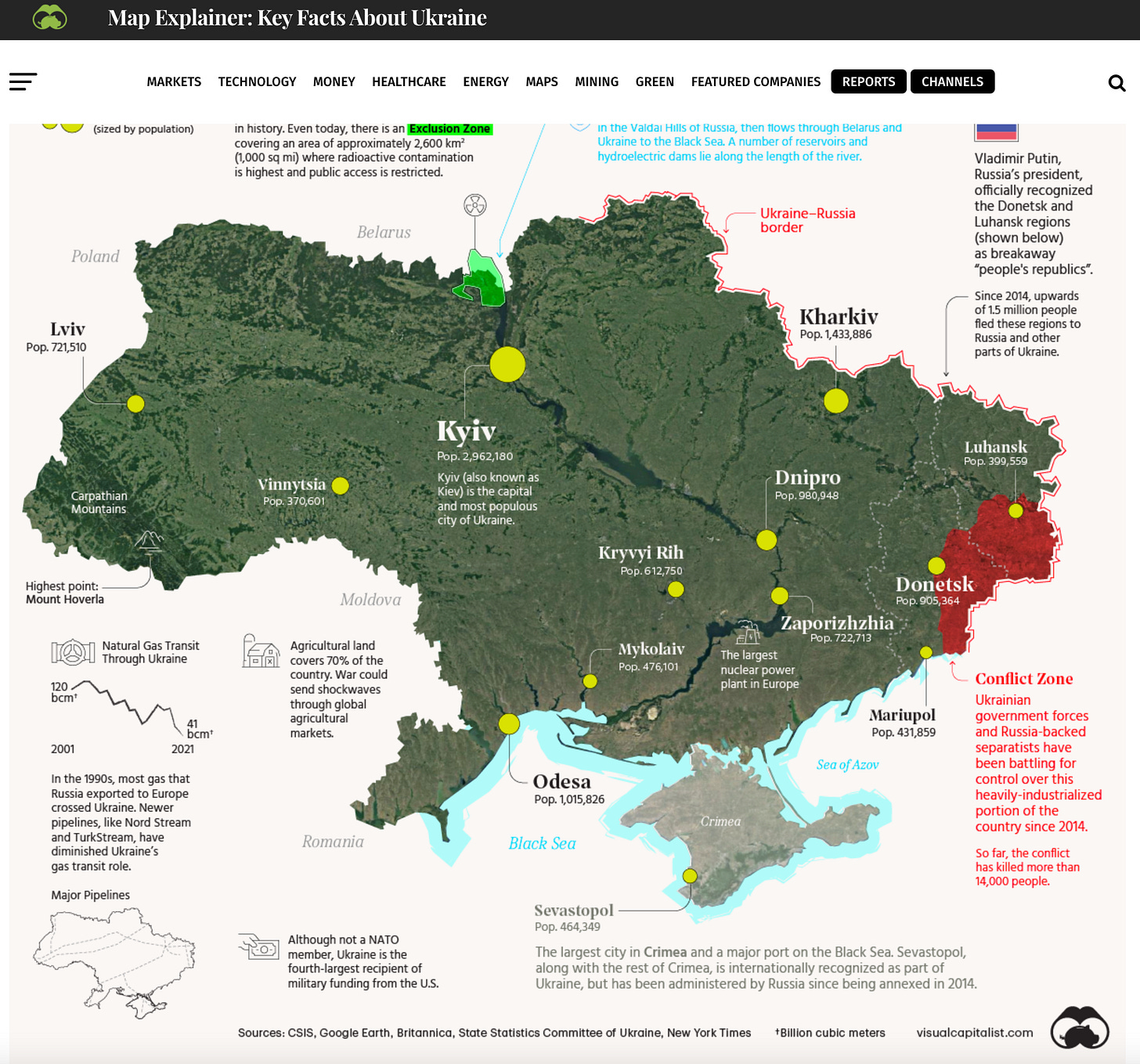Hello. I'm Chris Perry. I write about things that push the boundaries of thought. This week's letter attempts to make sense of events unfolding in Ukraine and new “perspective agents” participating in the conflict.
MATTERS OF PERSPECTIVE
The First Information World War
"The phrase ‘fog of war’ feels a bit inadequate now. The observed experience since last night feels more like a cyclone.” — Renee DiResta, Stanford Internet Observatory, 2/24/22
It's in our nature to process big things in small parts. However, partial views distort perception and depictions of reality, especially with paradigm-shifting events.
Like most, I've watched the world change in a matter of days. In my own attempts to gain perspective, I've focused on "new agents" vying for attention over the onslaught of headlines. It’s a lot to take in. This letter is a form of "thinking aloud," a sum of many parts reported so far.
Studying new actors and methods is foundational to making sense of information conflict. "In-network" fighting has simmered for years, now pushed into public view. Thomas Friedman coined it here as 'World War Wired' — the first military confrontation in an interconnected world.
He reported:
“What is coming out of Ukraine is simply impossible to produce on such a scale without citizens and soldiers throughout the country having easy access to cellphones, the internet and, by extension, social media apps.
A large-scale modern war will be live-streamed, minute by minute, battle by battle, death by death, to the world. What is occurring is already horrific, based on the information released just on the first day.”
Russia's invasion of Ukraine is not only an outrageous, immoral gambit. It's a 21st-century demonstration of power, a digital phenomenon with disorienting psychological effects.
In terms of scale, impact on the ground pales in regard to the reach of conflict felt worldwide. The exposure elicits online engagement and participation with the general public. McLuhan predicted World War III would be a borderless, guerrilla information war with no division between military and civilian participation. Russia-Ukraine validates his vision.
With varied platforms, actors, and motives, the digital environment starkly differs from past conflicts. Before looking at new properties, consider the last major military invasion that captured world attention. The Iraq invasion was a made-for-TV event, so overtly made for transmission, strategic planners billed it as "shock and awe." There were only three broadcast transmitters: the U.S administration, the U.S. military, and Iraq information ministers. A finite number of global news agencies supplied news coverage.
The environment then was structured and controlled. Now it's expansive, formless, and chaotic. When the Iraq war concluded in 2011, nightly news broadcasts attracted roughly 20 million viewers. Cable TV reached approximately 2.7 million. Last week, this "Dear Mister President Vladimir Putin" meme got 23 million views in a single day (along with plenty of hate).
The view gets more nuanced as you parse the range of participants, practices, and motivations. Beyond state and professional media sources, this war involves platforms, hackers, indie reporters, freelance analysts, opportunists, streamers, and more.
Platforms long ago usurped TV networks as primary information gateways. They're now used for battle planning, to signal intention, diversion, or censorship. In just a few days, Russia pressured networks to censor content. Meta barred Russian state media from running ads. Russia blocked Twitter as disturbing images played back into the country. Twitch and OnlyFans allegedly blocked users from Russia. It’s as if a set of"master switches" turns on and off as conditions change.
Meanwhile, private messaging accounts like Telegram operate as planning cells and base stations for pro-Russian propaganda. In response, state and non-state actors have jammed information lines and infiltrated Russia's communication. The hacking collective, Anonymous, declared 'cyber war' against Vladimir Putin's government and took down Kremlin-backed channels over the weekend.


To counter Russia's disinformation, teams of volunteer analysts have also banded together to investigate content, including altered photos and videos. They debunk and show the presence of Russian propaganda, from an exploded car with mysteriously swapped plates to Putin's misleadingly-timed security council meetings.



New data sources feed group analysis, including surveillance satellites showing detailed views of movements within Ukraine. Other organizations, such as the Center for Information Resilience, actively geolocate and verify satellite footage posted on social media.
Most visibly, indie journalists, aggregators, and advocates have taken to social media to report, pass on media, or commentate. They've accumulated massive reach on Reddit, Twitch, Substack, and Twitter. GenZ creators have also flooded TikTok, engaging in games of meme warfare. While news coverage highlights first hand-accounts on TikTok, satirical memes are flourishing in number.
And then there are opportunists. Some quickly assembled new "war pages" on Instagram. Other grifter accounts engage in a war for likes, gaming attention for followers, and ad revenue.
By no means exhaustive, the sample range of participants and motivations change the grammar of war and information operations. The whole system, structure, and language — the view — have new characteristics only seen as a complete, paradigm-shifting picture.
This prismatic "perspective war," with new modes of thought, tactics, and narrative frames, is an effect of new energy unleashed. It's too early to confidently predict what the impact will eventually be.
The first information world war has just begun.
SHOULD YOU WANT TO GO DEEPER…
The search for reliable information dominated my Twitter feeds last week. Here are some “vetted” newsfeeds of events on the ground.
If there are others you’ve found useful, please drop them in the comments.
Ukraine-Russia (via @noahpionion)
ONINTtechnical (via @OSINTtechnical)
Ukraine (reporters) (via @ddale)
Russia Ukraine 2022 (via @bobgourley)
Russia vs Ukraine (via TikTok)
/r/WorldNewsLive (via Reddit)
Or if you want to keep it simple you can follow the lead of Joan Donovan, one of the top disinfo research contacts out there.

A FINAL NOTE
Visual Capitalist, a Canadian media and news firm, creates and curates visual content focused on the latest trends in business and investing. It specializes in publishing visual explainers like infographics, data visualization, and charts. I find them to be helpful explainers on big complex topics like Ukraine. You can subscribe to their newsletter and more here.
Take great care, I'll see you next week.
- CP








